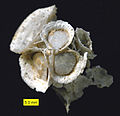| Hercosestria Temporal range:
| |
|---|---|

| |
| Hercosestria cribrosa (multiple individuals) | |
| Scientific classification | |
| Kingdom: | |
| Phylum: | |
| Class: | |
| Order: | |
| Family: | |
| Genus: | Hercosestria Cooper & Grant, 1969
|
| Species | |
| |
Hercosestria is an extinct genus of brachiopods from the Lower and Middle Permian. [1] They were important reef-forming organisms because of their conical shapes, attaching spines, and gregarious habits. [2] It is related to Richthofenia. [3] Species of the genus have been found in Texas (H. cribrosa and H. laevis) and Guatemala (H. notialis).
References
- ^ Paleobiology Database. "Hercosestria cribrosa". Retrieved 11 January 2012.
- ^ Weidlich, O. (2002). "Permian reefs re-examined: extrinsic control mechanisms of gradual and abrupt changes during 40 my of reef evolution". Geobios. 35 (Supplement 1): 287–294. Bibcode: 2002Geobi..35..287W. doi: 10.1016/s0016-6995(02)00066-9.
- ^ Cooper, G.A.; Grant, R.E. (1969). "New Permian brachiopods from west Texas" (PDF). Smithsonian Contributions to Paleobiology. 1: 1–20. doi: 10.5479/si.00810266.1.1.
-
Hercosestria cribrosa Cooper & Grant 1969 ( Roadian, Guadalupian, Middle Permian); Glass Mountains, Texas.
-
Hercosestria cribrosa Cooper & Grant 1969 (Roadian, Guadalupian, Middle Permian); Glass Mountains, Texas.
| Hercosestria Temporal range:
| |
|---|---|

| |
| Hercosestria cribrosa (multiple individuals) | |
| Scientific classification | |
| Kingdom: | |
| Phylum: | |
| Class: | |
| Order: | |
| Family: | |
| Genus: | Hercosestria Cooper & Grant, 1969
|
| Species | |
| |
Hercosestria is an extinct genus of brachiopods from the Lower and Middle Permian. [1] They were important reef-forming organisms because of their conical shapes, attaching spines, and gregarious habits. [2] It is related to Richthofenia. [3] Species of the genus have been found in Texas (H. cribrosa and H. laevis) and Guatemala (H. notialis).
References
- ^ Paleobiology Database. "Hercosestria cribrosa". Retrieved 11 January 2012.
- ^ Weidlich, O. (2002). "Permian reefs re-examined: extrinsic control mechanisms of gradual and abrupt changes during 40 my of reef evolution". Geobios. 35 (Supplement 1): 287–294. Bibcode: 2002Geobi..35..287W. doi: 10.1016/s0016-6995(02)00066-9.
- ^ Cooper, G.A.; Grant, R.E. (1969). "New Permian brachiopods from west Texas" (PDF). Smithsonian Contributions to Paleobiology. 1: 1–20. doi: 10.5479/si.00810266.1.1.
-
Hercosestria cribrosa Cooper & Grant 1969 ( Roadian, Guadalupian, Middle Permian); Glass Mountains, Texas.
-
Hercosestria cribrosa Cooper & Grant 1969 (Roadian, Guadalupian, Middle Permian); Glass Mountains, Texas.

